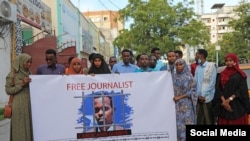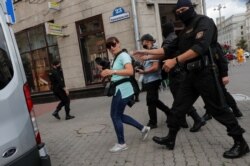Press freedom is under assault globally, as authorities seek to silence critical reporting by jailing journalists, according to new data from the Committee to Protect Journalists.
A record 274 journalists are in jail worldwide, with China, Turkey, Egypt and Saudi Arabia leading the field as the worst offenders, the press freedom organization’s annual survey shows. It is the fifth year in a row that more than 250 were imprisoned.
The 2020 count is “the worst on record” primarily for two reasons, CPJ’s advocacy director Courtney Radsch told VOA.
“One is the reaction to the global health pandemic, which has been met by the increased use of false news charges or fake news charges against journalists and retaliation for the independent reporting. And by a crackdown related to protests,” said Radsch. “We've seen that journalists are often the first ones arrested and detained and targeted during those protests.”
In 2020, at least 34 journalists globally were being detained on false news charges, most in Egypt, where 22 of the 27 imprisoned there face the accusation, the data showed.
As well as contributing to a rise in arrests, the coronavirus pandemic added urgency to calls from press freedom groups for authorities to release those jailed for their journalism. At least two journalists died of COVID-19 in custody — in Egypt and Honduras – and the family of a third, Kyrgyz journalist Azimjon Askarov, believe he also died from the virus, the CPJ report says.
“In a global health pandemic like COVID-19, a prison sentence for journalism could amount to a death sentence for journalism, because you can't socially distance. They don't have access to personal protective equipment, and prisons are vectors of infection,” said Radsch.
In Iran, 15 journalists were in jail for their work. One of those, Roohollah Zam, was executed on Saturday after Tehran upheld a death sentence for inciting violence during anti-government protests in 2017. Zam, of Amad News, was living in exile in France, but he was captured in Iraq and taken to Iran in 2019.
U.S. Secretary of State Mike Pompeo on Monday condemned Iran's “unjust, barbaric" execution of the journalist.
Vietnam, with 15 journalists behind bars, appears as the seventh-worst country. Nearly all those imprisoned face anti-state charges. Three Radio Free Asia journalists – Nguyen Tuong Thuy, Nguyen Van Hoa and Truong Duy Nhat – and VOA journalist Le Anh Hung and contributor Pham Chi Dung are among those imprisoned in Vietnam.
Stephane Dujarric, spokesperson for the U.N. Secretary-General, said at a daily briefing Tuesday that António Guterres is “appalled” by the findings of the CPJ report.
“In our day‑to‑day life, journalists and media workers are crucial to helping us make informed decisions. And as the world fights the pandemic, we can see that those decisions are even more crucial and can make the difference between life and death,” said Dujarric.
CPJ’s data acts as a snapshot of journalists in jail on Dec. 1. But many more were briefly detained in 2020. In the U.S. over 117 journalists were briefly detained or arrested covering protests over racial injustice or related to presidential elections, according to data released Monday by the U.S. Press Freedom Tracker.
“Protests have always been an incredibly dangerous place for journalists, compared to other beats,” Kirstin McCudden, managing editor of the Tracker, told VOA. “Really it began when George Floyd died May 25 in Minneapolis, Minnesota. By May 26 we saw our first assault of a journalist covering national protests, and by May 29, the first arrest of a journalist.”
In many cases, journalists identified themselves as press but were still detained and in some cases, had irritants sprayed in their faces, the Tracker found.
“We definitely heard from journalists that they felt the press pass did not protect them while they were out covering protests in 2020,” McCudden said, adding that there needs to be better communication with police.
In statements about the U.S. protests, the International Association of Chiefs of Police (IACP), a professional organization for police leaders, has said it is committed to the safety of communities. The IACP did not respond to VOA’s emails seeking comment.
Unrest in Belarus and Ethiopia led to an uptick in arrests in those countries, with 10 detained since the contested re-election of Belarusian President Aleksandr Lukashenko and seven in Ethiopia, where coverage of the conflict in Tigray state accounted for most press arrests.
The media watchdog Reporters Without Borders, which on Monday released its annual statistics of journalists and media workers imprisoned and held hostage, said at least 370 press workers have been arrested in an “unprecedented crackdown” in Belarus, with eight of those still detained in December.
Independent journalists already worked in a hostile environment in Belarus, but the harassment and violence escalated following Lukashenko’s re-election in August, RSF said.
The watchdog noted that as well as the chilling effect of arrests, journalists working in the country risk violence, loss of accreditation or, if working for foreign media, deportation.
RSF’s report, which uses a different methodology to CPJ, also noted the impact of the pandemic on press freedom, saying the number of journalists being arrested quadrupled between March and May.
“These figures confirm the pandemic’s impact on journalism and the unacceptable fact that some journalists are paying with their freedom for seeking the truth,” RSF’s report said.
Both RSF and CPJ listed China as the worst jailer of journalists. Radsch said that as well as jailing those who reported on the pandemic, Beijing has worked to expel foreign journalists in 2020, specifically Americans.
“China's imposition of the National Security Law on Hong Kong, as well as its apparent intervention on the issue of visas to foreign journalists, has dealt a crushing blow to press freedom,” said Radsch, adding that independent outlets in Hong Kong are struggling to counter strong pro-Beijing influence.








